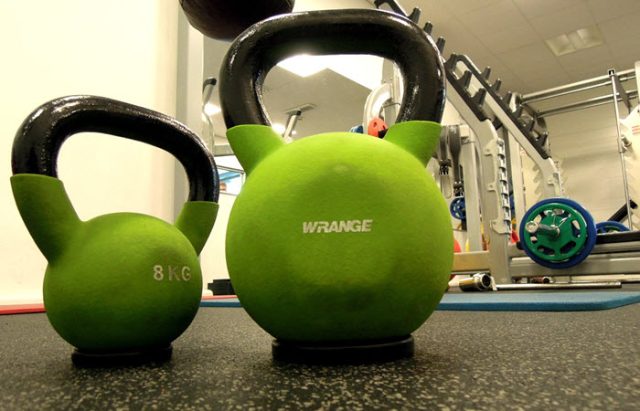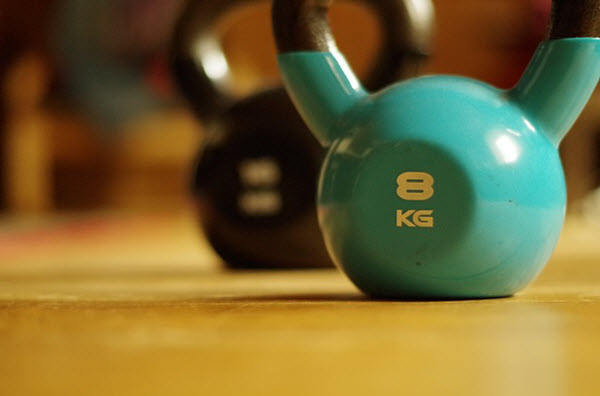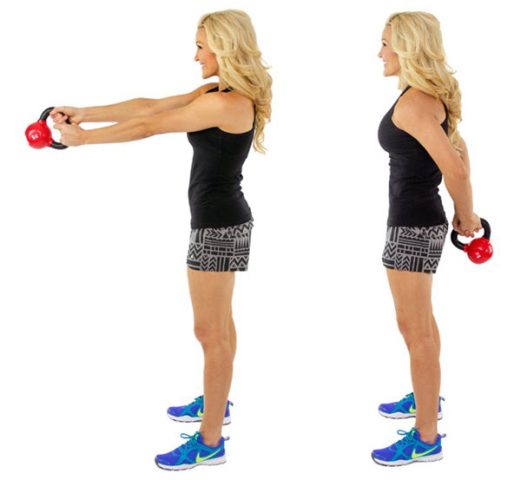15-Minute Full Body Kettlebell Workout
By Amanda Perkins
April 3, 2018 • Fact checked by Dumb Little Man

Most of us undervalue the positive effects of a 15-minute workout.
Many people think they need to spend hours in the gym to see results. Contrary to this belief, the intensity of a workout can actually have a bigger impact on your fitness than the duration.
The American Heart Association recommends 75 minutes of vigorous exercise per week to improve cardiovascular health. When you break it down, that’s only 15 minutes of exercise per day, five days per week.
What kind of intensity level does “vigorous activity” indicate?
Exercise professionals assess levels of activity by your heart rate and age group. There’s a simple equation to figure out your maximum recommended heart rate: 220 minus your age.
If your age is 37, you need to subtract 37 from 220 which gives you 183 as your maximum recommended heart rate. Vigorous activity, then, is 70 to 85% of your maximum heart rate. In this example, 183 should be multiplied by 0.7 and .85 to find the range you should keep your heart rate within(128 and 156 beats per minute).
If you aren’t wearing a device that tracks your heart rate, you check it yourself every few minutes. Simply count the number of beats at a pulse point for 15 seconds then multiply by four. Checking your pulse during active rest periods between exercises is an easy way to monitor whether you need to increase or decrease intensity.
Here’s your assignment for the workout below:
- Calculate your maximum recommended heart rate and your 70-85% range.
- For the next 15 minutes, try to keep your heart rate within that range while completing kettlebell the workout.
- As a general guideline, men should start with a 16 kg (35 lb) bell and women should start with an 8 kg (18 lb) bell.
- Get a timer that’s able to count seconds.

To keep things simple, there will be just four exercises to practice. The format is one minute of each exercise followed by 15 seconds of active rest. Repeat the five-minute sequence three times. Perform the exercises at the speed necessary to keep your heart rate within your 70 – 85% range.
Active rest is different from regular rest. You’re going to be doing something that keeps you moving, such as walking or jogging in place. Pick a few movements you enjoy doing and alternate between them. The important part is that you’re still active. Don’t forget to use this time to check your heart rate.
Exercise 1: The Kettlebell Crunch (1 minute)
This exercise is great for engaging the core and back muscles.
- Lay on the ground with your knees bent and your feet on the ground.
- Use both hands to grasp the kettlebell by the bell instead of the handle.
- Hold the bell above your chest.
- Use a slow, controlled motion to roll your upper back off the ground.
Active Rest: 15 seconds
Exercise 2: The Kettlebell Squat (1 minute)
Your quads and glutes should be burning during this movement.
- Use a shoulder-width stance.
- Hold the bell with both hands at chest level. Your palms should be facing each other as if you’re holding a ball.
- Bend your knees like you’re sitting down on a chair and bring the elbows to the inside of the knees.
- Your weight should shift to your heels.
- The kettlebell will help you balance by keeping your chest up.
Active Rest: 15 seconds
Exercise 3: Kettlebell Around the World (1 minute)
This exercise is great for grip strength, proprioception, and engaging your entire body. It pays particular attention to your obliques and other supporting muscle groups.
- Use a shoulder-width stance.
- Hold the kettlebell on the outer edge of the handle.
- Pass the kettlebell from one hand to the other as you move it all the way around your body.
- You can pass it at different heights around your body to use different muscles.
Active Rest: 15 seconds

Exercise 4: Kettlebell Push Press with Lunge (1 minute)
This movement is great for your arm and shoulder muscles.
- Use a shoulder-width stance.
- Hold the kettlebell by the handle in one hand. Your elbow should flex so that the bell is to the side of your shoulder.
- Let the kettlebell rest against your forearm with a loose grasp at the base of your thumb. Be careful to avoid hyperextension of your wrist.
- Step into a lunge.
- As your body lowers, extend your arm straight up.
- As you rise, lower the kettlebell back to your shoulder.
Active Rest: 15 seconds
Repeat this entire sequence twice
Exercises don’t need to be complicated or lengthy to be effective. Remember that any movement is better than no movement. The more effort you put into your workouts, the shorter they can be.
Exercise is great for combating mental conditions such as anxiety and depression. The next time you’re feeling confined to your office chair, take a 15-minute break and work out!
Amanda Perkins
Kettlebell Kings is a premium-quality kettlebell and kettlebell content provider, based in Austin, Texas. You can view our equipment, kettlebell how-to’s, and get expert advice at Kettlebell Kings. For more information, call us at 855-7KETTLE to learn more.

